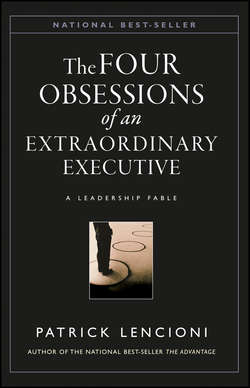Читать книгу The Four Obsessions of an Extraordinary Executive - Patrick M. Lencioni - Страница 6
На сайте Литреса книга снята с продажи.
INTRODUCTION
ОглавлениеIf everything is important, then nothing is.
No one understands the power of this saying more than a person who leads an organization. Whether it is a multinational corporation, a department within a larger company, or a small entrepreneurial venture, every organization provides its leader with more distractions and concerns than one person can handle.
The key to managing this challenge, of course, is to identify a reasonable number of issues that will have the greatest possible impact on the success of your organization, and then spend most of your time thinking about, talking about, and working on those issues.
But what are they? Before we can identify them, it is important to understand what is ultimately necessary for organizational success.
I believe that all successful organizations share two qualities: they are smart, and they are healthy. An organization demonstrates that it is smart by developing intelligent strategies, marketing plans, product features, and financial models that lead to competitive advantage over its rivals. It demonstrates that it is healthy by eliminating politics and confusion, which leads to higher morale, lower turnover, and higher productivity.
As important as both of these topics are, I have found that most leaders spend the majority of their time and energy making their organizations smarter, with relatively little effort directed toward making them healthier. This is understandable considering the predominant focus of business schools and business media. It is regrettable, however, when one considers the powerful and unique attributes of organizational health.
First, healthy organizations have a way of making themselves smarter. Even if their ideas are temporarily inferior to those of competitors, they are usually humble and efficient enough to recognize their deficiencies and make changes in their plans before it is too late. On the other hand, plenty of anonymous and forgotten companies have squandered intellectual advantages because of infighting, lack of clarity, and other problems that plague unhealthy organizations.
Second, healthy companies are far less susceptible to ordinary problems than unhealthy ones. During difficult times, for instance, employees will remain committed to a healthy organization and stay with it longer, ultimately working to reestablish competitive advantage.
Finally – and this point is critical – no one but the head of an organization can make it healthy. While executives often successfully delegate responsibility for strategy, technology, marketing, or finance to their direct reports, they cannot assign responsibility for their organization’s cultural well-being to anyone but themselves.
And so, as odd as it may seem, it is actually more important for leaders to focus on making their organizations healthy than on making them smart.
But don’t misunderstand me. Not for a second am I saying that issues like strategy, product innovation, and marketing are unimportant. They are indeed critical and deserve a great deal of mindfulness from any executive team. It’s just that these topics receive a wildly disproportionate amount of attention from well-meaning and intelligent executives who somehow cannot find the time and energy to focus on making their organizations healthy.
Why does this happen? Because organizational health is relatively hard to measure, and even harder to achieve. It feels soft to executives who prefer more quantitative and reliable methods of steering their companies. It also entails a longer lead time to implementation than does a technical or marketing strategy, which yields more immediate results and gratification.
But perhaps most important of all, organizational health is often neglected because it involves facing realities of human behavior that even the most committed executive is tempted to avoid. It requires levels of discipline and courage that only a truly extraordinary executive is willing to embrace.
The purpose of this book is to help executives understand the disarming simplicity and power of organizational health and the four actionable steps that allow them to achieve it. It begins with a tale of two companies, a healthy one fighting off a potential virus, and an unhealthy one searching desperately for the cure.
This is a work of fiction. Any resemblance to real life is purely unavoidable.
